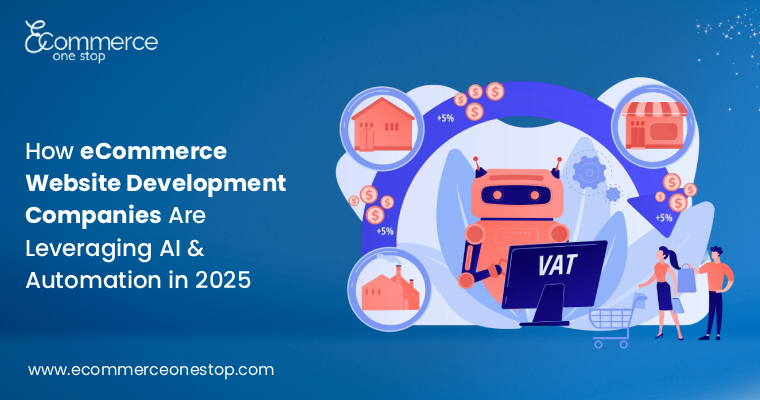Did you know that 72% of eCommerce professionals now use AI every day in their work (
Forbes, 2024)? This shift shows how quickly things are changing.
eCommerce website development companies are building sites that use AI and automation to make shopping faster and more personal. These tools help stores handle more customers without extra staff.
If you're running an online business, understanding this can give you an edge. In this blog, we'll look at how top players in the field, like the
best eCommerce website development company, are putting these technologies to work.
Get Your Project Started
Book a free consultation with our Ecommerce experts.
Connect Now

What Makes AI a Key Part of eCommerce Development Services Today?
AI helps create sites that learn from user behavior. For example, it suggests products based on past buys. This keeps shoppers coming back. The global AI market is expected to grow from $279.22B in 2024 to $1,811.75B by 2030 at a 35.9% CAGR (
Grand View Research).
One big change is in site speed. AI optimizes images and code on the fly. This means pages load quicker, even on slow connections. Shoppers hate waiting, so this small tweak can cut bounce rates.
From what we've seen in projects, adding AI early saves time later. It spots issues before launch, like broken links or slow parts.
How Does Automation Streamline Backend Tasks in eCommerce Sites?
Automation takes care of routine work, giving teams more time to focus on bigger goals. In inventory management, it tracks stock in real time. When items start running low, the system can send alerts or even reorder automatically.
For an eCommerce website development company, this often means creating dashboards that display everything at a glance. Store owners no longer need to guess which products are selling quickly or which ones need restocking. The eCommerce market is expected to reach $3.66 trillion in 2025 (
Statista).
Payment processing also becomes more efficient with automation. Fraud checks run instantly, flagging unusual activity such as multiple purchases from unfamiliar locations, while normal sales continue without delays.
Customer support is another area that benefits. Chatbots respond to common questions any time of day, which reduces waiting times and allows human support staff to focus on more complex issues.
Here are a few ways automation improves eCommerce websites:
- Reduces mistakes in order fulfillment by tracking patterns.
- Speeds up email confirmations and updates.
- Simplifies returns with quick, one-click options.
Together, these steps help eCommerce websites run more smoothly and provide a better experience for customers.
Why Choose AI for Personalization in Your Online Store?
Personalization turns a generic site into one that feels made just for the user. AI looks at browsing history and preferences to show custom content. Think about homepages that change based on location or time of day. In the morning, it might highlight breakfast items; at night, snacks.
The best eCommerce website development company uses AI to group users. New visitors see basics, while regulars get deals on favorites. This approach builds trust. Shoppers feel seen, which leads to more buys.
Data shows it's working. Businesses with AI personalization see higher engagement.
How Are Predictive Tools Shaping eCommerce Automation?
Predictive analytics forecasts trends. AI crunches sales data to predict what's next. It might say, "Stock up on winter gear soon." For developers, this means adding modules that connect to sales platforms. Sites pull in forecasts to adjust displays automatically.
Automation pairs with this for dynamic pricing. Prices shift based on demand, but fairly, to keep customers happy. In supply chains, it plans shipping routes better. Fewer delays mean happier buyers.
What Benefits Do These Technologies Bring to eCommerce Sites?
The advantages go beyond just numbers. eCommerce sites become easier for customers to use, with smoother navigation and faster responses. AI chatbots handle queries quickly, improving overall customer satisfaction.
Automation also reduces costs. Routine tasks no longer require extra staff, saving both time and money.
For growth, these technologies help smaller stores compete with larger ones by using smart systems that boost efficiency and sales.
Some common uses and benefits of AI and automation include:
- Personal Recommendations: Suggests products to users, improving sales and engagement.
- Inventory Automation: Tracks stock levels and reduces overstock, helping manage resources efficiently.
- Chat Support Bots: Provide round-the-clock assistance, easing the workload for human teams.
- Predictive Pricing: Adjusts prices based on trends to improve revenue.
- Fraud Detection: Monitors transactions to prevent losses and keep payments secure.
Using these tools helps developers build eCommerce sites that can adapt and grow with the business.
How Will AI Evolve in eCommerce Development Next?
AI is expected to get smarter with features like voice and image search. For example, a user can take a photo of an outfit, and the site will find similar items instantly.
Automation will connect more closely with real-world logistics. Warehouses may use drones or robots controlled through the site to manage inventory or deliveries efficiently.
For eCommerce development companies, staying updated with these changes will be important to maintain an edge.
Some challenges remain, such as keeping user data secure. Good developers plan for data privacy from the start, making sure these systems are safe and trustworthy.
Conclusion
AI and automation are changing
how eCommerce website development companies operate in 2025. They make sites smarter, faster, and more customer-focused. From personalization to backend efficiency, these tools drive real results. As trends grow, businesses that adopt them early will thrive. It's an exciting time for online retail.
Ready to update your site?
Connect with our team at the best eCommerce website development company for tailored eCommerce development services. Let's chat about making your store stand out.
FAQs
1. What is the typical cost to add AI features to an eCommerce website in 2025?
Costs range from $10,000 to $50,000, depending on site size and features. Basic chatbots start lower, while full personalization setups cost more. Factors include custom coding and integration time.
2. How long does it take to build an AI-powered eCommerce site from scratch?
It usually takes 3 to 6 months. Planning and testing add time, but using pre-built AI modules speeds things up to 2 months for simpler projects.
3. Which AI platforms work best for small eCommerce businesses in 2025?
Options like
Shopify's AI tools or Gorgias suit small shops. They're easy to set up and affordable, starting at $29 per month, without needing deep tech knowledge.
4. Does AI integration require major changes to an existing eCommerce website?
Not always. Many updates plug in via APIs, taking weeks. But for big gains, some redesign might help, like updating the backend for better data flow.
5. How does AI handle data privacy in eCommerce development?
AI systems follow rules like GDPR. Developers use encryption and consent tools to protect info. Regular audits keep things secure as laws evolve.



